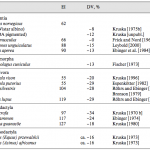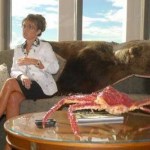Uncategorized
What grabbed people at Neuron Culture this month?
Hands-down winner: Does depression have an upside? It's complicated, which looked at the uproar raised by Jonah Lehrer's NY Times Magazine story on "Depression's Upside." Depression and evolution: two very complex dynamics there. Much rich ground to explore, this got some great comments. I'll do more, eventually â in the book, if not before.
Close behind in second place, despite that I posted it only on the 29th, is Accidental brain evolution suffers a reversal. John Hawks should get main credit for this, since almost the whole post is an…
My previous post on the Myriad gene patent decision has resulted in one of the most useful and enjoyable comment threads in the history of this blog.
The debate revolves around a single, central question: while it's clear that the loss of gene-based patent protection (should the current decision be upheld by the Supreme Court) will be beneficial for companies and academic labs seeking to develop multi-gene tests - extending up to whole-genome sequencing - will these benefits come at a disastrous cost to the field as a whole by eroding financial incentives for innovation?
This…
The Independent has revealed plans by CERN to build a new particle accelerator along London's 23km Circle Line. The use of supercooled magnets would make it London's first air conditined underground line.
In related news, CERN have announced that yesterday's high energy collisions, the first to reach 7 TeV, have resulted in the creation of a 'paleoparticle' from the prehistory of the Universe, stating: "The physicists have nicknamed it the "neutrinosaurus" because of its repulsive appearance and prehistoric origins"
Now that the world's first commerically-available jetpack has gone onto…
If you haven't already browsed through Nature's most recent edition, do so immediately - it's packed with juicy genomic goodness.
I particularly enjoyed the brief commentaries from Francis Collins and Craig Venter, both providing retrospectives on the last decade of human genomics and predictions for the future of the field, and the neat infographic illustrating the staggering change in sequencing capacity over the last ten years - but the whole issue is well worth reading.
Domestication is by far man's greatest genetic experiment, and we've been at it for well over 10,000 years. While domestication can produce wild variation (see my post on dogs, for example), a few changes seem to be universal. These include behavioral changes, like reduced fear of humans and friendliness, as well as physiological ones, like floppy ears (they develop in domesticated foxes, too). One of the most well-documented differences between domesticated animals and their wild counterparts is their brains: across every species that has been looked at, the brains of domesticated animals…
Ali Hussain Sibat seems to be a bit of a kook. He was on a silly television show in the Middle East in which he'd make paranormal predictions, and he also was making a religious pilgrimage to Saudi Arabia. The latter was considered just fine; the former has got him in big trouble. The Saudi government convicted him of sorcery and is planning to decapitate him.
Now that is barbarism. Here in America we let fortune-telling frauds get rich, instead.
Keep an eye out for Bond Action. Very scary stuff.
Thanks, Uncle Bob, for sending me this.
... Kevin Bales explains the business of modern slavery, a multibillion-dollar economy that underpins some of the worst industries on earth. He shares stats and personal stories from his on-the-ground research -- and names the price of freeing every slave on earth right now.
Greg Hickok thinks so. http://talkingbrains.blogspot.com/2010/03/mirror-neurons-unfalsifiable-theory.html
(via Instapaper)
Posted via email from David Dobbs's Somatic Marker
Double helix, courtesy NIH/National Genome Research Institute
It's the 10th anniverary of the coding of the human genome. Snuck up on me -- but not on Nature or Reuters. Both of these outfits â two of the best science/med reporting teams out there â published big, beautiful, multipart packages today. They're worth a look even if you're not a genome geek.
Reuters looks at what NIH director and former director of the National Human Genome Research Institute Francis Collins found when he finally had his genome run last summer: a disposition for type-2 diabetes, among other things. Collins was…
Help two nerds win a crate and barrel wedding contest!
Our love story.
We met in a hallway at the Museum of Natural History in Cambridge, Massachusetts. Chris was on his way to the lab where he researched birds and I was working as a scrub for a famous professor. We realized that we both loved wine, food, music, dogs and all things of a dorky nature. Game on!
Three important details about our Ultimate Wedding.
1. Chris' parents are doctors who immigrated from Sri Lanka to New York in the late seventies. I am wearing a sari for the wedding as part of tradition. I hope the wedding is really…
My uncle describes Costco as the place "where you go broke saving money". That certainly describes my experience of the warehouse store - I walk in for some toilet paper and leave with a new television, a tub of cashews and a lifetime supply of chapstick. ABC News recently had an interesting profile of the retail company:
Costco's membership is largely made up of middle- and upper-middle class families and small business owners who pay $50 to $100 for annual memberships. So far this year, Costco has reported $386 million in revenues from membership fees alone.
Loyal customers are willing to…
So what exactly is light, anyway?
It's a tough question. Isaac Newton thought it was composed of streams of microscopic particles he called corpuscles. Really it wasn't a bad idea. Light rays travel in straight lines just like fast moving projectiles, light bounces off objects in a manner not entirely unlike a ricocheting bullet, and if you try hard enough you can even explain refraction in terms of particles being slowed in matter online the lines of a ball bearing sinking in molasses.
But it's pretty hard for the particle view to explain diffraction and interference, which are both very…
Image: wemidji (Jacques Marcoux).
Nam et ipsa scientia potestas est (And thus knowledge itself is power)
-- Sir Francis Bacon.
The next edition of Scientia Pro Publica (Science for the People) is less than two weeks away and as usual, it is seeking submissions and hosts! Can you help by sending URLs for your own or others' well-written science, medicine, and nature blog essays to me or by volunteering to host this carnival on your blog?
Scientia Pro Publica is a traveling blog carnival that celebrates the best science, environment, nature and medical writing that has been published in…
NCSE's Josh Rosenau organized a Netroots Nation panel on science denial. Featured speakers: Josh, Bryan Rehm, Michael Stebbins, Mark Sumner, Susan Wood
NCSE
David Brooks, summarizing the current state of happiness research:
The daily activity most injurious to happiness is commuting. According to one study, being married produces a psychic gain equivalent to more than $100,000 a year.
In other words, the best way to make yourself happy is to have a short commute and get married. I'm afraid science can't tell us very much about marriage so let's talk about commuting. A few years ago, the Swiss economists Bruno Frey and Alois Stutzer announced the discovery of a new human foible, which they called "the commuters paradox". They found that, when…
I think one of the easiest ways Web 2.0 can contribute to individuals' health is to help us maintain those buddy relationships, even when we can't see our buddies in person...
See Sharing your Workouts Online
Dear Discovery,
This is really hard for me to say. We've been so close for such a long time, and I feel like there was something real between us. Sure, there have been some rough times, like when you decided deforestation was worth televising. We've had our fights about silly things like how you perpetuate a negative stereotype through shark week and whether ghost hunting is valid programing for a science-oriented network. I've cheated on you with National Geographic a few times, and yet you forgave me. In spite of all our troubles, I still love you, mostly because of Mike Rowe, Dave Salmoni…


